|
No, as a whole, has a bad rap. We learned of its mighty power at age two, and ever since then we as a society have been taught that No is naughty, arrogant, self-serving, oppositional, wrong. Only People with Power Over Us are allowed to use the word No (like, for example, Mom and Dad).
I think growing up with this viewpoint has screwed up what Yes is all about. Yes is likeable, friendly, pleasing. Yes means More, right? So we are inclined to say Yes to as many things as possible, because it makes us more Loved, Valued, Honored by friends, family, peers, and of course, People with Power Over Us. Somehow, saying Yes will give us many rewards, open doors, make us happy. I say Yes a lot. A LOT. You need a favor? Sure! Wanna borrow something? Of course! Need some help? You bet! Its true, for a hot second you are saving someones bacon, and that feels really nice... until you realize, oh crap, there's a payment for every Yes: Time. Energy. Commitment. Work. Attention. That adds up substantially over time, and then suddenly you have no time, no energy, poor commitment, you're spread thin, you're distracted. You burn out. And often, the kneejerk Yes you spat out, when really reviewed in hindsight, well, its more of a Maybe. We say Yes to a lot of Maybe situations, or rather, situations we haven't really had a moment to run through thoughtful consideration, or truly in our heart of hearts we just don't wanna do but feel obligated for some reason. I've been reading Greg McKeown's "Essentialism: The Disciplined Pursuit of Less" and he has a whole chapter devoted to the art of saying No, and what No really means. Contrary to our personal belief (which, remember, was established back in our second year of life), No is really about the true value of Yes. No is about determining what is of value to you, your time, your energy, your commitment. No is about creating space in your world to develop who you really are and what you need to do to get where you want to go in life. No is about doing your best work, living your best life. People who say No regularly are not, on the whole, oppositional, but rather they actually value Yes. They use it when they actually mean it, when things are lining up, the time is right, the energy is there, the passion and commitment are at ready. People who understand the real power of No don't hit others with it like a two year old, but are very good at setting true expectations, are often honest, and in return, they may momentarily disappoint others, but often they garner respect in a way that us Yes People do not. Additionally, for most of these people, Maybe is just a very shy No; if something is a maybe, its really a "meh"-be, and therefore is lumped into the No category as well. People who understand the Art of No are actually incredibly passionate, checked-in, driven, and fulfilled. Nay, successful! They are focused on what really works for them, how they can be of best service to mankind. As someone who says Yes to everything, I'm so intrigued by this, this secret other world. I actually hate, hate being agreeable all the time - its people pleasing that leaves me drained, and more and more off my own course, which half the time I don't even know what that is anymore. No one really respects my Yes, anyway. They expect it, but not respect it. And because I say Yes to everything, obviously some of the Yes's fall by the wayside, which in turn makes me a flake. So yay, now I'm unreliable to boot. No one cares if you're spread thin, said Yes to too many people or projects, or are tired -- if you flake on their Yes, by God, you have some serious explaining to do. Of all the Yes's, why their Yes? You avoid all of this with No. I said No the other day to a "favor" casually tossed at me. It felt weird to say No, but it was a time and energy commitment request on the same day I had another commitment that meant far more to me, and had more riding on it. Often I'll try to accommodate, but this time I actually politely said no, it wasn't possible. I could hear the disappointment in the other person's voice, but truly, it lasted all of 5 seconds -- 5 seconds -- before they said "I hear ya, darn, okay, too bad" then the subject changed to something else. And suddenly, I was free of guilt, over commitment, frustration, and anxiety, all because of that little No. I walked away from the conversation in a far better place than had I said Yes. I'm still by far a No newbie. I still have to actively stop myself from responding immediately to requests, and give pause as I review what the request really entails with commitment. I am still not used to untangling myself from an identity of "helpful" as "valuable", and redefining what is actually valuable to myself. My poor health has really forced my hand with this lifestyle change, but in the bigger picture, its a far healthier, more honest way of living and I wish I had considered learning the Art of No years ago. But now is as good a time as any, right?
0 Comments
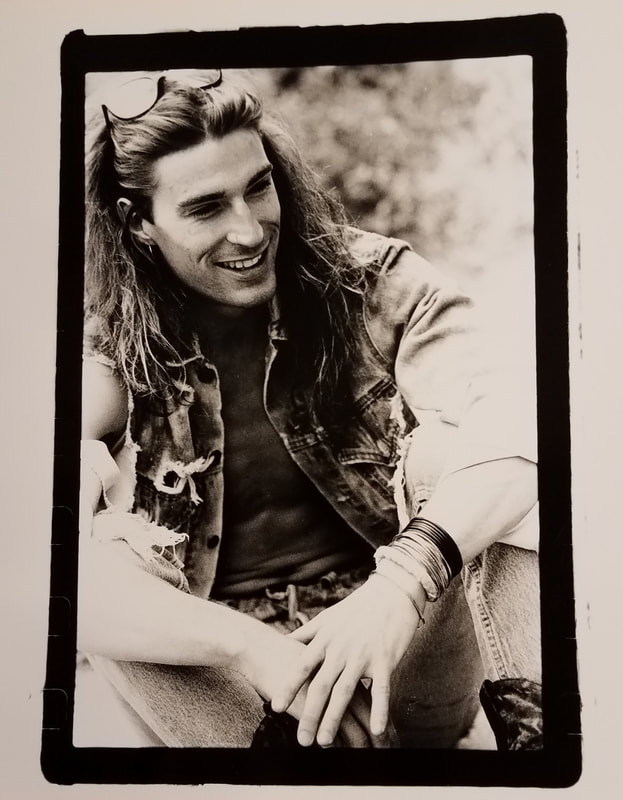 Sean Kinney Sean Kinney So this summer my frame shop, Mainframe, is hosting a photography show by Paul Hernandez entitled "Star Gazing". Its a collection of photographs, many never published, of Seattle bands of the late 80s/early 90s, including the grunge greats such as Mother Love Bone, Pearl Jam, Soundgarden, and Alice In Chains, as well as Green Apple Quickstep and even an awesome early shot of Duff McKagan. Most of the images are in black and white and either shot in the studio, or in places like The Vogue or Central Tavern. Some are shot out in the urban decay of Seattle (under trestles, abandoned buildings, crumbling edifices of the south side). There are a lot, I mean a LOT, of photos of Alice in Chains, but it makes sense since Paul befriended the band and fraternized with them in and out of the professional shoots. Because of that, he managed to catch a lot of "inside the moment" shots, when the guys let their guard down, sometimes smiling when they shouldn't, exhaling the pressure of the day, just being dumb kids on the cusp of Whatever. I poured over the images, all made the "old fashioned" way in a darkroom from these things called Negatives, many of them pocked by time and needing retouching by hand, which Paul has done lovingly. These guys were all a couple years older than me -- Duff and I even attended the same high school -- and like most of us kids in Seattle, I was both super pumped and a little alarmed at how quickly they all skyrocketed into fame in such a compressed amount of time. I hardly turned 21 before the tavern shows were a thing of the past, and now all these bands played arenas and Lollapalooza and being a five foot nothing girl, it was impossible to see anything in a big show. Plus, I was in art school and couldn't afford more than a $5 cover charge, so I figured, fuckit, I'll just buy the damned CDs, watch the damned videos on MtV, and build my own empire. Which I did, by the way. And these guys were my soundtrack. I have plenty of Seattle musician friends, ex-girlfriend friends, I-used-to-hang-out-with-Jeff-in-1987 friends, so I have gotten a few stories about This Guy or That Chick. I've even hung out with a few of these rock stars - my face blindness is so bad, I've spent time with a couple rock stars and didn't realize it until much later on, which is kind of a mixed blessing for all involved (Sean Kinney needs to thank his Gods for the hour we spent talking about art, me being totally clueless as to who I was talking to, even when he mentioned his name very sheepishly and I just blankly stared at him like "ok, so what?", even though my little brain was like, wait, whoa, wait, noooo, really? It was such a great art conversation, I didn't want to blow the mood). Seattle is a tiny Big Town - if you grew up here, you can't help but know someone who knows someone. And people love to talk. Paul, however, is kind of different to talk to. He's a different duck, to start with. He still dresses the part of a grunge guy, 30 years later, only his hair is silver, but still unflappably long. When he talks, his whole body moves, like a willow tree in the wind. His head bobs up and down, as if he's taking everything in at all angles; his conversations are not for the lazy. Its like Butoh with words. He's very soulful, and can easily switch from a comment about crappy traffic to computations on the meaning of life, and you sense that whatever is on his mind will not be censored. I have learned that about photographers: they really do shoot from the hip. They understand the pregnancy and gestation of the moment, and there's nothing to waste, especially time and bullshit, of which they seem to tolerate very little of. They are both patient and anxious. Paul is very much on that razor's edge, a monk on the verge of losing his shit. But he never does. When Paul showed me his photographs, he emitted both excitement and sorrow. I swear, if you see the photos reflected in his eyes, they wouldn't be static black and white images but moving pictures, living memories of a bygone time. The stories he tells tumble out hodgepodge and I can't keep them straight: did he get kicked in the head at a Pearl Jam show or Alice in Chains show? Was it Stone Gossard he cried with over the death of Andrew Wood? Whose idea was it to shoot pics at the old train trestle with which band again? I know I'm listening, but the stories, they tumble, and anyway I'm overly distracted with the photos before me and my own memories and the feels that wash over some stagnant part of my old lady brain, and, and, and... God, they all look so YOUNG. Paul is a wizard. It doesn't matter what he says at this point. His magical camera apparatus caught reflective light bouncing off these mortal figures, these musical gods, my hometown heroes, and his magical brain picked the very second, the perfect second, to snap these photos and capture their souls and deliver them to my table at my frame shop. Paul keeps talking, and it doesn't matter. He could tell me he was Eddie Vedder's Siamese Twin and they did a vaudeville act together until they were separated in 1984, and it doesn't matter. The truth sits in front of me on photo paper, and also behind my optic nerves, the shooting stars in my own mind. Its not about him. Its not even about these musicians. Truth is, its all about me. How all of this shaped me. That's why the bands are so important, why we so badly want to "know" these people. When they die, I die too. Its why its seems to hurt so bad. I didn't have to know Layne Staley personally to be able to connect to whatever soulful energetic cable he was tethered to, through his music and voice. I took that energy and glomed it to my own during my painting sessions, and voila, I made game art and paintings and gave those to the world and now some kid out there plays Magic the Gathering with a little bit of Layne in there. And that kid will take that and make his own art or music or stories or whatever, and pass that along. See, its a beautiful thing, right? Paul does matter, of course. His photos humanize these young men, remind us of how bright and honest and full of life they were, how we all were like that once. When we all *wanted* to be rock stars. That's what Star Gazing is really about; its not a death cult, or a rehash-the-past, or even a cash-in-on-nostalgia. I mean, it *could* be, but it isn't. Its mostly about us. Me. You. Paul. Seattle.
When the show opens in August, we've decided not to release a catalog, printed or online. Some of the images are too raw and controversial to publish right now - in fact, Paul has to get the blessing of the Staley family for one of them, it may get pulled altogether. But mostly, the photos need to be seen in person, as a group, in Seattle. I hope if you're in the Seattle area and you read this, you take a quick trip to Georgetown to visit this retrospective while its up. (Show info: "Star Gazing: A Paul Hernandez Retrospective, Seattle Catalogue 1989-1993" opens Friday, August 10th, 7-9 pm with musical guest Tim Bertsch at Mainframe 5628 Airport Way S, Ste 150 Seattle. Runs August 11-October 7, 2018) I'm currently working on a new painting called "St Thecla and the Deer", expressly created for a show/event in France called Chimeria, which opens October 6th. Most of the artists invited are visionary or fantastical artists, and the theme is Myth. St Thecla is not a mythical person, she was a real person, but her life story has many magical elements to it, creating a sort of Christian myth. The original composition for my painting was quite large and in landscape form, with the full figure of St Thecla standing in a grassy patch in a birch forest. It was intended to be highly chromatic, with nods to Symbolists Edvard Munch and Odilon Redon in terms of use of color shapes. But then... I got hit with a couple of issues. One was the reality of shipping such a large panel to France. The other was time. The amount of time to complete a large scale painting like this did not match up with my measly painting schedule. So I had to edit my idea down, and Thecla was revised to a square panel of about 24 x 23", in portrait form. I have to admit, I didn't really do my homework on the composition very well. I normally do several thumbnail sketches, and then a full value sketch before working on the actual painting. Instead, I sort of attacked the panel with conte crayons, drawing directly on the panel, which does work in many cases but since its a new way of doing things for me, I wasn't able to make reliable decisions on the composition. What resulted was me making a lot of changes mid-stream... which sometimes is fun, but slows everything down considerably. The first change I had to make was the dress color and the general colors of the piece. The idea of a red dress worked in the full figure version, but not in this case. The use of high chroma -- intense colors -- would be claustrophobic in such a tight, portrait composition. I repainted her dress in gold tones but what I'm going to do is add a blue damask pattern on top of the gold, a sort of floral patterning common in Renaissance dress. The second change I had to make was Thecla's hands. She kind of looked like she was choking out the deer. So I sanded down that area and added a softer composition. Finally, the birch trees were too thick, too cool in tone. They looked like prison bars. So I sanded those down and made them warmer and thinner. I will add more branches to them once the paint dries, to give a sort of halo effect around her head. Most painters understand the idea of the underpainting; you're laying down the building blocks of the painting. I work out a lot of my kinks and I like to build up texture in this state, but the details are not set. I like to glaze; I usually do several layers of glazes on my paintings, building up luminosity. At this state, things are pretty flat and bleh. Details are missing. Highlights are missing. Things don't really come together until way later in the game, which is why I am not very comfortable showing my work at unfinished states.
I know its not the easiest, cleanest way to work, and normally I would not have cut some of the corners I did on this piece due to time constraints. However, I kind of like the nature of the hunt, finding the painting, you know? I'll keep y'all posted on the progress of this piece as I hammer away at it, but I guarantee its going to look quite a bit different the next time I post an update. The other day I was reading an online post from a friend of mine in which she explained how chronic anxiety boxed her in. I could definitely relate, as did several of her online friends. However, in reading this, I wondered "Do mentally healthy people actually exist?". I noticed that I had a distinct lack of people in my life who claimed to be healthy and happy, or at least healthy.
I looked up "symptoms of mental health" online. It was actually a little difficult to find; I had to wade through a ton of articles on how to ACHIEVE mental health, but none from someone actually claiming to be healthy. I did find a couple of entries defining how a mentally healthy person functions in our society, which was a start. For example, here is a Wikipedia definition: en.wikipedia.org/wiki/Mental_health. I think there is a difference between being mentally healthy and having a happy life. You can certainly have both, but a mentally healthy person also deals with the trials and tribulations the rest of us have to deal with. Because they make healthier choices than the rest of us, they probably have better outcomes, but life isn't always fair or kind. So I was curious: how does a mentally healthy person THINK? How is it different than me, and can I train myself to reroute those neurotransmitters to think more like a healthy person? Since again, I have a lack of mentally-ill-free people in my life (at least, according to their therapists), I don't have a whole lot of role models to work with. However, I'm imaginative and observant, so at the very least I can speculate how a healthy person traverses through daily activities. Thus, my new self project began: Think Like a Healthy Person. For the last week, I've been stopping myself throughout the day to ask myself: how would a healthy person handle this? The answer is often: not how I handle it, that's for sure. However, the solutions I come up with aren't too difficult to employ. Here's an example: I'll get a bill, and my gut drops (it always drops when I get a bill). I'll ask myself: Okay, how would a healthy person address this bill? Because my normal response is to throw it in a pile to forget about it, but I'll still have it stew in my brain, building up anxiety. I would imagine a healthy person would do one of two things: check the due date and if they can't pay it right away, schedule it with a reminder, then move on. If they can pay it right away, they pay it, then move on. In other words: Address the issue, then move on. So the last few bills, I both paid and/or scheduled. The result? Clearly less anxiety. Oddly, I was surprised at how hard it was to take care of the bills right away, at least mentally. I fought it with the resistance of a two year old. Damn, I mused, I am really stubborn. I've been using this to address more complex issues as well, mostly involving interactions with difficult people. I am finding that people are difficult in part because I allow them to be, in my life. I recently had to deal with a guy that I employed to do some work for me, and he's been utterly disappointing. He makes constant excuses that, as a client, I don't really need to hear or WANT to hear. I just want to know when something can be completed, not his sob story. The bottom line: he's just not fulfilling the expectations we initially set up for this job. What would a healthy person do? Let him go. What have I done? Gone in circles with him, arguing over his botched timelines, and given him umpteen chances to fix his mistakes and increasingly grow frustrated with him, and then complain to everyone around me, which initially blows off steam but does nothing to fix the situation. Honestly, I saw red flags early on but ignored them, essentially overriding my judgement of the situation as to how it could affect me down the line. I made the situation difficult by not addressing the 900 pound gorilla in the room the moment it entered. Yes, it would have been uncomfortable to say, "hey, I don't think this is the right fit, sorry", but the discomfort would have been minuscule compared to the months of haggling we've currently gone through. And I STILL had to let him go. A lot of the difficult situations I've had the last few years could have been addressed very early on and many of them avoided, but alas, I don't think like a healthy person just yet. But I have noticed, since I've started this personal project, that when I do make changes, I'm relatively satisfied with the results. The loose threads aren't there, tangling up in my brain. I ended the week feeling less drained than normal, less defeated. I complained a little less. I got a lot more tasks completed than I expected to, but with less mental energy charging them up. So yeah, mentally healthy people may be like mythical unicorns - they may not exist in pure form. I like to believe they're out there, and maybe I'll actually meet one. In the meantime, asking myself what a mentally healthy person would do in a variety of situations really just allows me to stop and examine how I think, and if that thinking is not adding any value to life, try something new. I don't need to be a slave of habit or mental disorders, as long as I have the skill of observation at hand. Addisons Disease is something I have to address every. Single. Day. Which can be tricky, since its not easy to gauge like diabetes is. I don't have a little cortisol counter that can reliably check my cortisol levels and alert me that I need more steroids in my system. I have to kind of feel it out all day long.
Am I unusually tired? Cranky? Craving salt? Sweating too much? Dizzy? Bloated? Lethargic? Am I slurring? Nauseated? Suddenly getting a headache? Have I had enough water to drink? Am I shaking? Cold? Hot? Cortisol is a hormone that gets a bad rap. Its called the "bad stress hormone", but really what it does is counter stress, both physical and mental. Too much of any hormone in your body is bad, that's simple biology. But not at all, or not enough to keep you balanced, that can be deadly. And without cortisol and its sidekick aldosterone, your body can fly off the handle with inflammation, temperature fluxing, mineral balance, blood sugar balance, detoxification... you get the picture. I take two steroids to replace both cortisol and aldosterone, but the amounts I take are not really reflective of what I really need; its kind of a baseline guess. Some days I clearly need more steroid to counter the stress I'm under (called "stress dosing"). "Stress" is anything: pain, injury, heat, illness and yes, emotional/mental stress. If I'm stress dosing often, then there's definitely a problem (working too much is often the culprit). You don't want to take too much steroids than you really need: it may mimic the natural hormones but its still manmade and has its own issues. So every day I have to figure out how much stress and activity I can realistically handle. My doctor and I have worked out how much "stressful activity" I can handle a day, which is about 7 hours, and includes everything from driving, regular work, errands, athletic endeavors, cleaning, etc. Some days I wake up and I'm already depleted (bad sleep, illness, chronic pain are big culprits here). Even fun things are stressful to the body, so even when I'm doing something fun, if it takes a lot of energy, I have to watch it. "Emotional stress" is the hardest to gauge. Getting in an argument, crying, anger, these can wear me out pretty fast. Low levels of chronic emotional stress can wear me down over a period of time, but the wear and tear is very real and I've had more than one episode where I was sent to the hospital for just the teensiest little slight, after months of teensy slights. For Addisonians like me, holding a grudge is a deadly thing. Too much stress can set off an Addisonian crisis, which is when the body utterly fails in a stress response. Symptoms can be low blood pressure, nausea/diarrhea, low electrolytes, surging body pain, inflammation, unconsciousness, shock and cardiac arrest. Even if you've been drinking water, you can suffer dehydration (minerals being off, excessive sweating). I'm often winding up in the hospital a few times a year in crisis, usually triggered by flu, stomach bug, or overwork. Its a very unpleasant thing to go through. I have an emergency injection kit I carry, in case I get into a situation (like an accident) where emergency response is not immediate enough. Its meant tide you over long enough until fluids and IV steroids can be administered. One of my biggest challenges is finding ways of eliminating unnecessary stress. That, for me, is figuring out how to keep my work ethics under control, or keeping toxic relationships out of my life or at arm's length. It also means how to handle life challenges and problems in such a way that it doesn't eat me alive, or I don't stew over things. In this blog, I'll likely write about my adventures in searching for that sweet spot with my health. Finding a good balance with stress, know when something is too much, and how to set up boundaries. The gammaCore is a vagal nerve stimulator: it has two electrodes that you hold against your vagal nerve on your neck. You turn it on and for a couple of minutes it puts out an electrical pulse. The goal is to eliminate and/or reduce cluster or migraine headaches.
The FDA has not approved the device yet, so you have to sign up to participate in a program to use it. Additionally, because its not approved, its not covered by insurance. Its got a built-in battery that only lasts about 30 days from the time of usage, so you have to buy a unit every 30 days. The unit is $500. Kinda pricey. My neurologist wants me off all the drugs she put me on to manage my chronic pain, and wants to have me use nonevasive items like the gammaCore to manage things like headaches. I'm all for getting off drugs, I just got off Cymbalta for pain management and I want to get off gabapentin if at all possible. I'm taking all the supplements she wants me to take and they seem to be helping. The Quell device (which is like a tenS device on steroids) has helped with my nerve damage, so even though gammaCore is pricey, if it does its thing and resets my nervous system, great. I'll give it a whirl. Today I gave it a whirl. I started getting a migraine this morning. It often starts from other stimuli, such as neck spasms, allergies, extreme temp changes or a nose bleed. Today it was neck spasms - my neuralgia is acting up. I unpacked the gammaCore from its gift-like box, put the conductor gel on the electrodes, stuck it to my neck and turned it on. My neck made a noise I've never heard it make before, a kind of high pitched crack. A wave of pain shot through my head and down both sides of my neck. This can't be good! The box comes with a booklet, which I did read, but nested in the booklet is a Warning page. I read through it while rubbing my neck... ahhhh! Right after the part where it says not to use it if you have heart problems, it states not to use if you have plates or screws in your neck. I do have both, from my double spine fusion 8 years ago. Well dang. I guess my doctor didn't bother to read this thing either, since they are well aware of my damaged spine at the clinic. So, guess this is off the table for me. I took some Maxalt and a handful of vicodin, and sprayed my neck with magnesium oil. I still have the option to try neuro-acupuncture, although I've got a healthy amount of skepticism towards it. Hugo is my not-quite-three-year-old Boxer. He is a very complex dog: he can be playful, but then suddenly cranky and sullen. He'll want to eat whatever you're eating, but when you finally give him a little bit of what he's been literally drooling for, he'll roll it around his palate a few seconds, spit it out, then stare at you in disgust, as if you've just pranked him. I think he may be an old soul; while he does have typical Boxer traits (jumps, plays, kinda dumb, wiggles his butt a lot), he does appear to get lost in thought. After a few minutes of Deep Thoughts, he'll come over to me, whine a little, and want an ear scratch or belly rub. He'll thank me with a hearty lick to the face, then settle down for one of several daily naps, usually right next to me on the couch.
Sometimes I'll talk to him about my day, or things that bother me. I know he listens because if I raise my voice, he'll appear quite concerned. Sometimes he'll "talk" back, a sort of Scooby Doo sounding retort, and if I don't let him get air time, he'll get frustrated and speak louder and louder until he starts barking at me in utter exasperation. So to honor him, I am calling this blog "Hugo Howls". I want a place where I can talk a bit about the very real issues of having an autoimmune disease that literally saps my life energy, or what it can be like being an old-school visual artist, or the pitfalls of dealing with chronic pain. Sometimes I want to talk about my dogs (I also have a Boxer named Duke), weird things about my hometown, or the art of fishkeeping. Really though, I just like talking a lot. |
AuthorJulie Baroh is a US artist, entrepreneur, and chronic chatterbox. Categories
All
Archives |
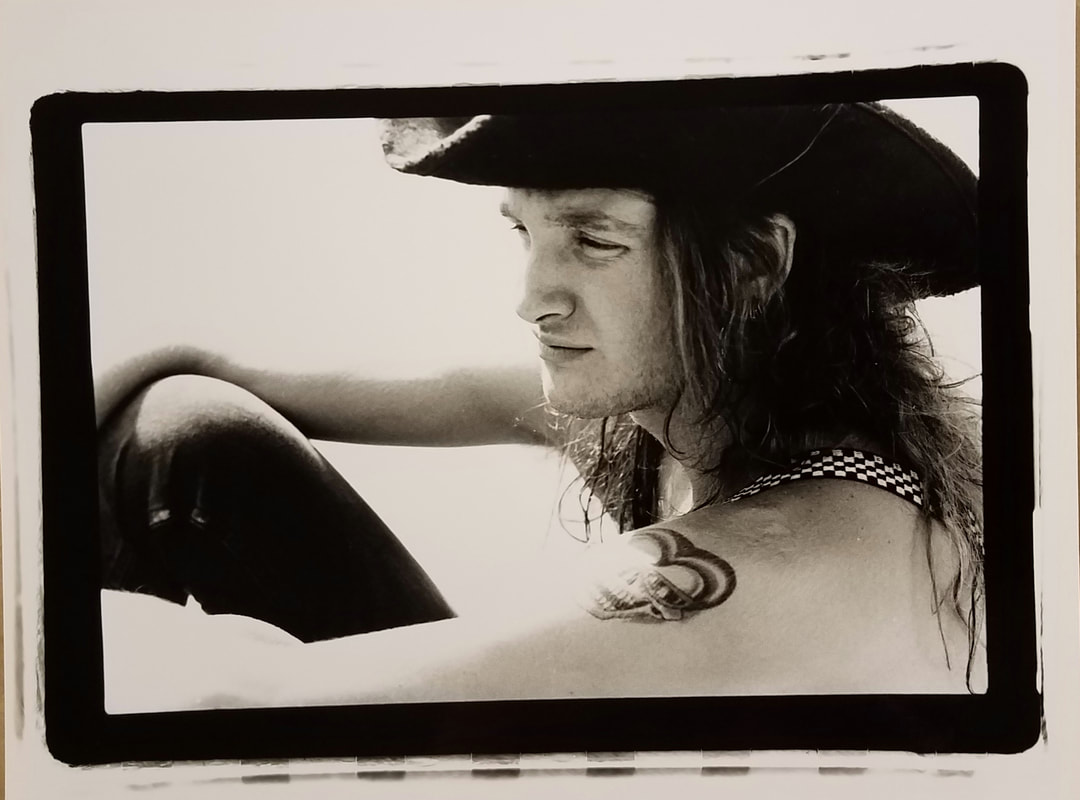
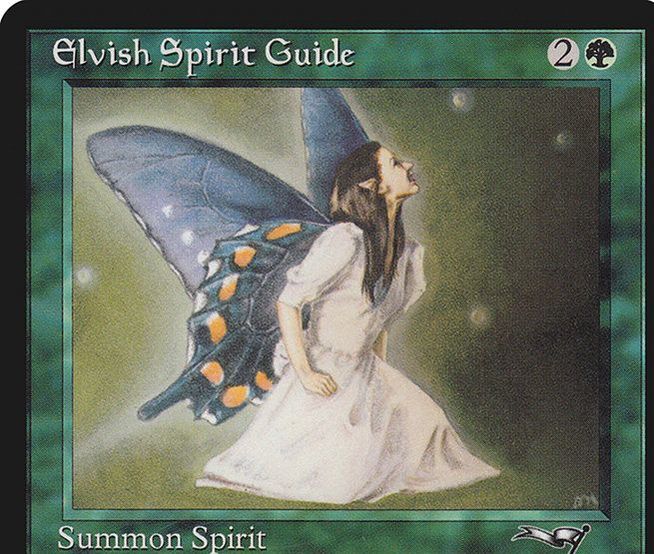

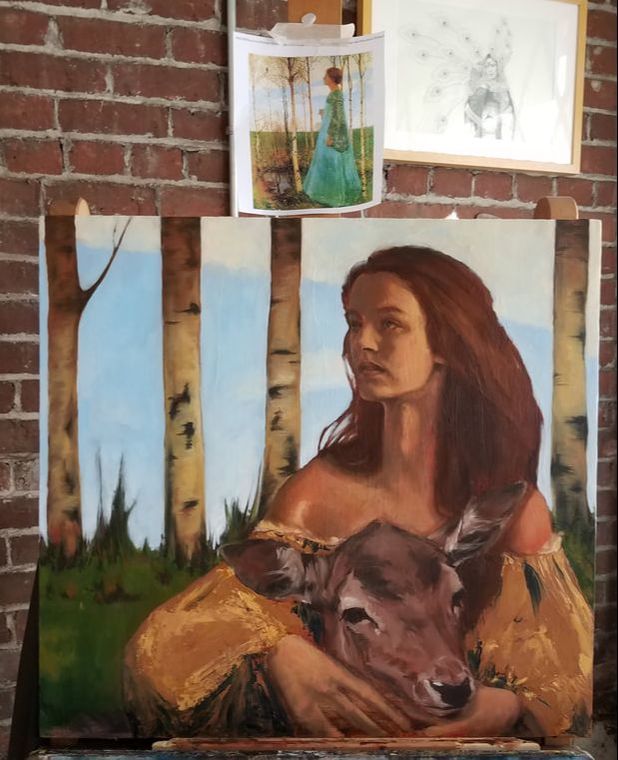
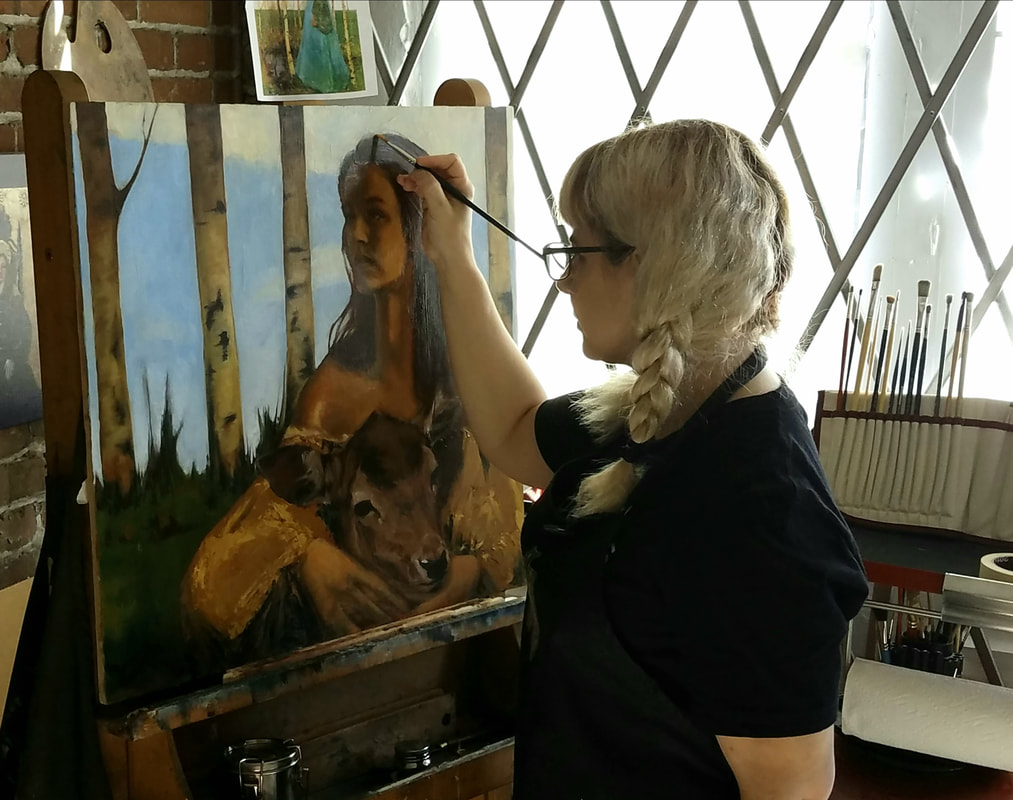
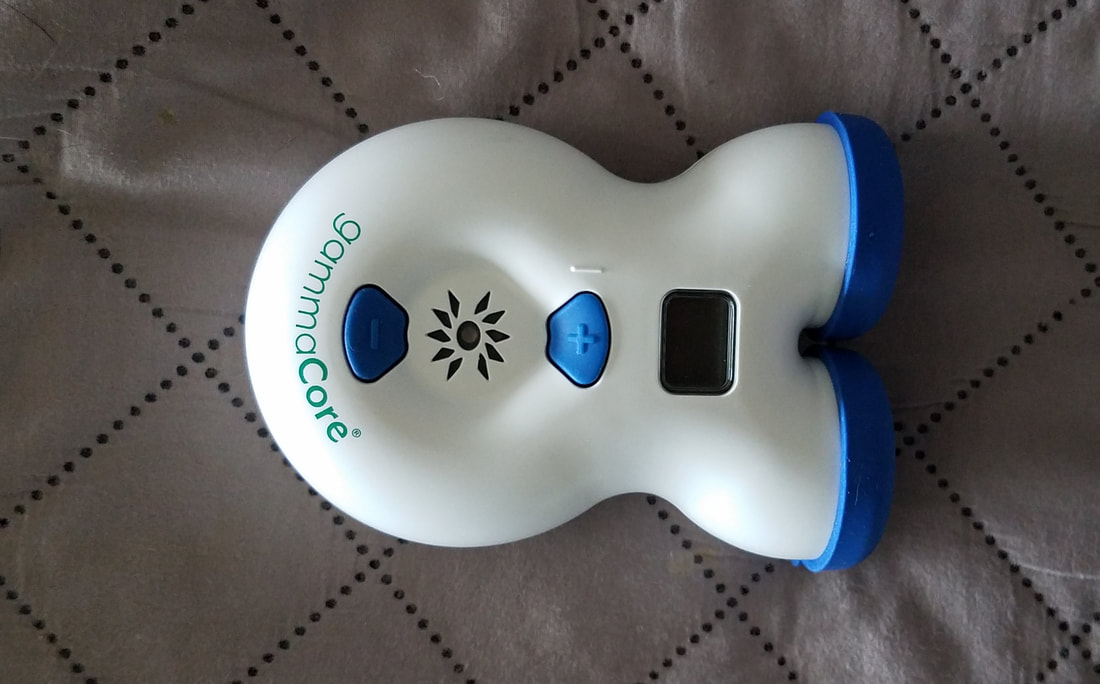
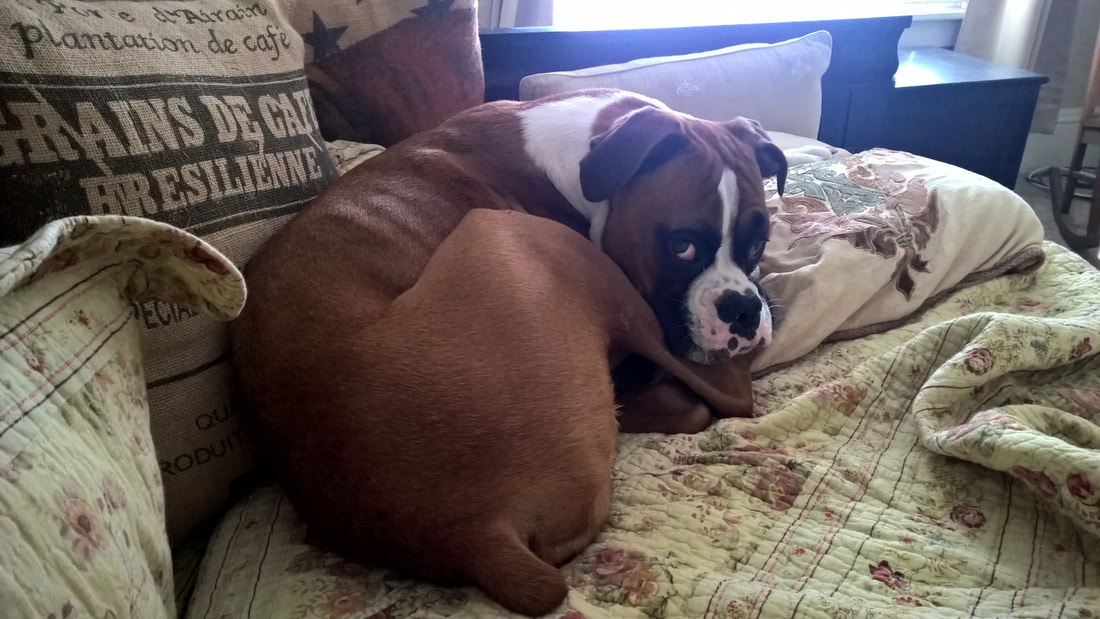
 RSS Feed
RSS Feed
